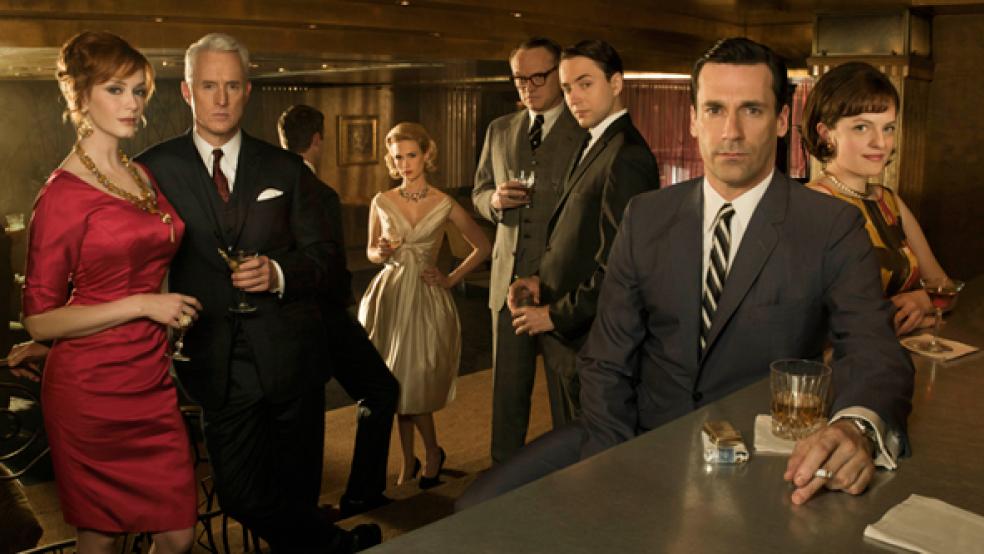Mad Men went out with an ambiguous smile, where many expected a sharp descent. The loose ends have mostly been tied up, the various theories debunked or proven, and at least in one case the ‘shippers have been satisfied, but the finale’s most brilliant move was in allowing the viewer to fill in the blanks at the end.
In fairness, this was no Sopranos ending where the viewer is asked to play “The Lady or The Tiger.” The show clearly told us that a “happy ending” is in store for Don … it just didn’t show us how he gets there, and because of the viewers’ history with the show, it didn’t really need to.
Do we really need to see Don coming back from California and winning back his place at McCann Erickson, in the exact same way he won his way back at SC & Partners in the first half of the season? Do we really need to see Don struggle to be a single father? Do we need to see him make another miraculous pitch that ultimately ends up being the historically groundbreaking “I’d Like to Buy the World a Coke” ad?
Related: Why AMC Won't Miss Mad Men That Much
We’ve seen it all before, and while there might be joy to be had in yet another Don Draper crawl back from the gutter fueled by his own form of genius, none of it could be quite as satisfying as that enigmatic smile that breaks on Don’s face. Like the Mona Lisa, its meaning says more about the viewer than the subject. Was that Don finding a measure of contentment and enlightenment or simply coming up with the absolutely perfect pitch to get his life back on track in NYC? Was he finding a way to be a good parent to his children, or did he just want back in the game. The answer to these questions is: “Yes.”
The show has laid clues all season long to this ending. Coke (the soft drink) has been a recurring motif throughout the season, from the carrot used to lure Don into corporate life to the busted Coke machine in Oklahoma. The outfits worn by the denizens of the commune were almost daring you to not think of the iconic ad. As a side joke, the episode includes an early scene of Joan and Richard trying a different kind of coke.
But the real keys to Don’s path to redemption lie in two therapy scenes. Don doesn’t speak in either — and for a man who has demonstrated his ability to hypnotize a meeting with his presence, these silences speak volumes about his mental state. In her final scenes, Stephanie Draper confronts her feelings about abandoning her child. For all of the early ‘70s talk of doing what makes you happy, Stephanie knows that on some level she has still abandoned a child that will never forget or possibly forgive her for it. As Betty points out, Don has all but abandoned his own kids in his quest for self.
Related: Better Call Saul: AMC’s Gutsy Gamble Pays Off
The finale’s real moment of genius, though, was in handing its final monologue to someone else. Rather than having Jon Hamm’s baritone deliver the speech that at long last bares his soul, he simply watches as another man says the words he can’t articulate. The man, though opposite Don in many ways, shares the same deep insecurities. And what metaphor does the man use? An item sitting on the shelf of a refrigerator. Like, say, a can of…soda.
The other characters, having reached their point of closure, were all given suitable send-offs. Joan and Peggy are allowed to realize their different dreams, one of independence from the system and the other to be taken seriously within it. Peggy and Stan’s romance may have been a touch rushed, but is anyone unhappy to see them together? Roger and Joan, the other fan favorite couple, were also given an appropriate ending that did not betray their characters. Even Pete’s dreams came true (while Harry Crane remains the same miserable bastard he’s always been).
For a show that so many predicted to have a dark ending, the finale was honestly kind and generous. We have spent a decade with these characters, and we love them…and this isn’t Game of Thrones. That the ambiguity of the final two scenes allows for a more cynical reading is not a detriment to the show. Its ability to work within ambiguity, subjectivity and self-created illusions is exactly what the show has always been about.
Well played, Mad Men. “A thing like that!” Indeed.
Top Reads from The Fiscal Times:




